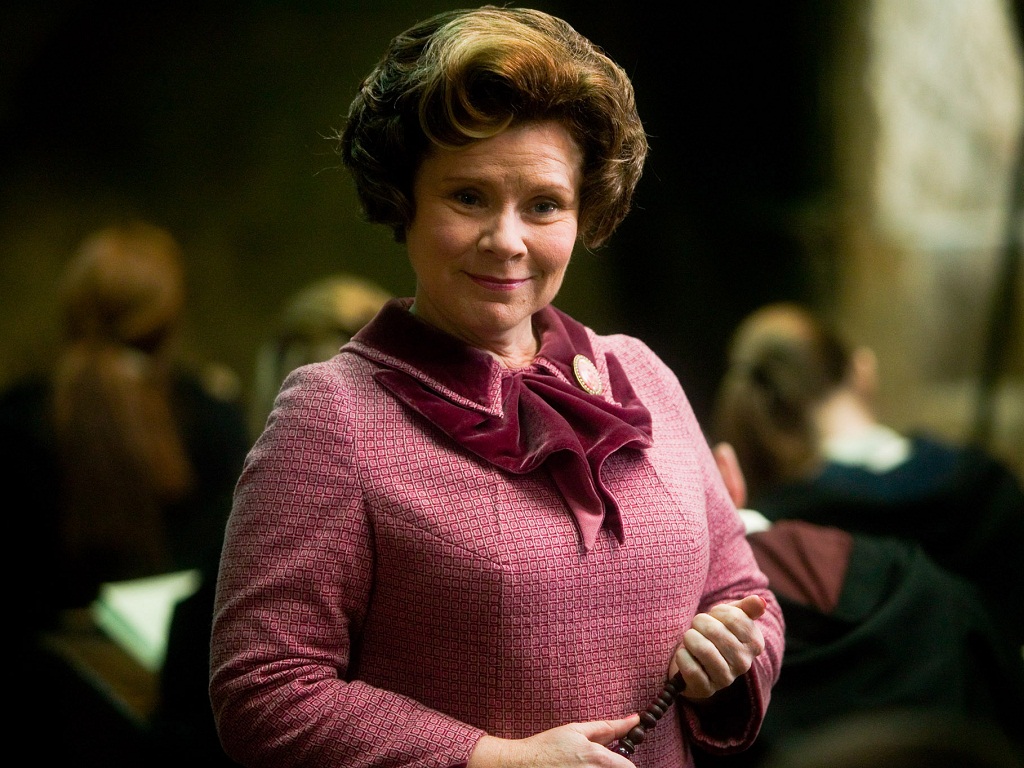Although J.K. Rowling wrote the final book in the Harry Potter series in 2007, she continues to give Potter fans an occasional fix, publishing short works that add a little more color and detail to the Harry Potter story. Ardent fans know that Rowling wrote a short Prequel in 2008. Also, earlier this year, she began writing new stories about the 2014 Quidditch World Cup Finals for Pottermore, the website for all things Harry Potter. She later followed with a story that takes the form of an article published in The Daily Prophet (“Dumbledore’s Army Reunites at Quidditch World Cup Final”), which gives us the first glimpse of the adult Harry Potter.
Now, on Halloween, we get “The Story of Dolores Jane Umbridge” — a short fictional essay that gives us a more complete personal portrait of the character that readers found so easy to dislike. In the essay [SPOILER ALERT], we learn that Umbridge was, gasp, a half blood, who had demonstrated a certain capacity for wickedness at a young age: “Even at seventeen, Dolores was judgemental, prejudiced and sadistic, although her conscientious attitude, her saccharine manner towards her superiors, and the ruthlessness and stealth with which she took credit for other people’s work soon gained her advancement.”
Rowling then appends some personal comments to the story, explaining the origins of the Umbridge character. She writes:
Once, long ago, I took instruction in a certain skill or subject (I am being vague as vague can be, for reasons that are about to become obvious), and in doing so, came into contact with a teacher or instructor whom I disliked intensely on sight.
The woman in question returned my antipathy with interest. Why we took against each other so instantly, heartily and (on my side, at least) irrationally, I honestly cannot say. What sticks in my mind is her pronounced taste for twee accessories. I particularly recall a tiny little plastic bow slide, pale lemon in colour that she wore in her short curly hair.… [H]er tendency to wear frills where (I felt) frills had no business to be, and to carry undersized handbags, again as though they had been borrowed from a child’s dressing-up box, jarred, I felt, with a personality that I found the reverse of sweet, innocent and ingenuous.
To learn more about the fictional and non-fictional sides of Dolores Umbridge, read Rowling’s new piece here.
Related Content:
How J.K. Rowling Plotted Harry Potter with a Hand-Drawn Spreadsheet
Take Free Online Courses at Hogwarts: Charms, Potions, Defense Against the Dark Arts & More
The Quantum Physics of Harry Potter, Broken Down By a Physicist and a Magician



Mudblood is generally accepted to mean born to two muggle parents, not just one.
when is the book and movie coming out about doris umbridge
wow its sound nice
I wonder what Rowling’s teacher thought when she found out she’d been turned into a caricature in one of the dullest franchise in the history of movie franchises. Seriously each episode following the boy wizard and his pals from Hogwarts Academy as they fight assorted villains has been indistinguishable from the others. Aside from the gloomy imagery, the series’ only consistency has been its lack of excitement and ineffective use of special effects, all to make magic unmagical, to make action seem inert.
Perhaps the die was cast when Rowling vetoed the idea of Spielberg directing the series; she made sure the series would never be mistaken for a work of art that meant anything to anybody?just ridiculously profitable cross-promotion for her books. The Harry Potter series might be anti-Christian (or not), but it’s certainly the anti-James Bond series in its refusal of wonder, beauty and excitement. No one wants to face that fact. Now, thankfully, they no longer have to.
>a‑at least the books were good though
“No!”
The writing is dreadful; the book was terrible. As I read, I noticed that every time a character went for a walk, the author wrote instead that the character “stretched his legs.”
I began marking on the back of an envelope every time that phrase was repeated. I stopped only after I had marked the envelope several dozen times. I was incredulous. Rowling’s mind is so governed by cliches and dead metaphors that she has no other style of writing. Later I read a lavish, loving review of Harry Potter by the same Stephen King. He wrote something to the effect of, “If these kids are reading Harry Potter at 11 or 12, then when they get older they will go on to read Stephen King.” And he was quite right. He was not being ironic. When you read “Harry Potter” you are, in fact, trained to read Stephen King.